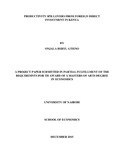| dc.description.abstract | There has been a degree of ambiguity surrounding the effect of FDI in literature. While a few
studies report positive effects from FDI at the microeconomic level, there are those that find that
FDI yields negative effects. The Kenyan case is especially curious in regards to this, given the
persistently poor performance of the manufacturing sector, despite heavy foreign presence in the
country.
Using firm-level panel data from Enterprise Surveys, the study examines the spillover effects of
foreign direct investment (FDI) in the Kenyan manufacturing industry. The analysis considers
the endogeneity of input choices and clustering errors, which have the potential to cause biased
estimations. The ensuing results suggest that negative spillovers from FDI arise from horizontal
linkages, and that there are positive spillovers from backward linkages. The extent to which
domestic firms benefit from FDI differs based on firm characteristics such as size. | en_US |

